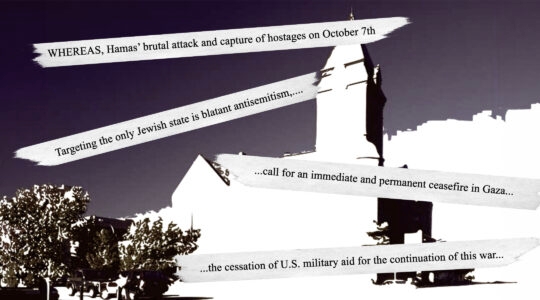NEW YORK (JTA) — See. Feel. Act.
These three words are Judaism’s answer to the questions that occur to religious people at this time of great human suffering in Haiti.
There are two kinds of questions that we find ourselves asking when we are confronted with scenes such as the disaster that has struck the island nation.
On the one hand, we ask "why?" Or, more intensely, "How can God have allowed this to happen?"
On the other hand, we ask "what?" — "What can I, a single helpless individual hundreds of miles away from the tragic scene, do to help?"
Quite simply, our tradition insists that we "shelve" the first type of question. It has been asked before, perhaps millions of times over the course of history. Answers abound, and the theological literature deals with it at length. But none of the answers has ever totally dispelled the question.
Judaism insists instead that we ask the question of the second type. We must inquire as to the response that God requires of us. And to that inquiry the answer is powerful and clear: See! Feel! Act!
First, we must "see." We cannot yield to the understandable temptation to block the scenes of suffering from our visual senses. We must watch scenes of the catastrophe and allow ourselves to be impacted by them.
Second, we must feel the pain of those who are suffering so horribly. We dare not anasthetize ourselves to that pain. We cannot allow ourselves to in any way explain the suffering away, with sick, silly, smug but sadly comforting statements such as "they must have deserved it." We must see the victims as humans no different from ourselves, innocent and blameless, who are in a condition of desperation and dire need.
And then we must act to respond to that need. There are always ways to act, no matter how distant we are from the scene of tragedy, no matter how impotent we might legitimately feel.
Moments of tragedy and crisis are not the times to philosophize about God. This is not the time to speculate about "why bad things happen to good people." It is the time to ask, "What can I do to help those poor good people?"
Those of us who have lived lives of faith and religious commitment know that the answers to our doubts about God do not come forth from our philosophical quest. Rather they slowly issue from the context of a life of moral action, from deeds of charity and compassion.
The Jewish community, in its entirety, can be proud of its response thus far to the Haitian catastrophe. Rescue teams from the State of Israel and millions of dollars from the Jews of America are but examples of our response. Whatever the motivation for these responses, this has been a religious response, a Jewish response.
The way to deal with religious doubt and skepticism about God is to act compassionately and to respond generously, in faith and certainty, and in confidence that our actions will allow us ultimately to bear witness to God’s benevolent love.
(Rabbi Tzvi Hersh Weinreb is the executive vice president emeritus of the Orthodox Union.)





